
Accessibility Practice Insights
Aspiring to support new voices, ideas and knowledge in mental health.
Mental Health Today Live is once again online! The last two years have been a watershed moment for public health, and our thinking about mental health care in 2022 should be no different. Together, we can aspire to support new voices and ideas and update our knowledge of mental health today.
Week 1
Accessibility
Building services without barriers for the deaf community.
Lenka Novakova

Lenka is a Deaf advisor working for a national Deaf mental health service based in Southwest London and St. George’s Mental Health NHS Trust.
Lenka previously worked in deaf education and then went on to work as a child mental health worker at the National Deaf CAMHS Corner House inpatient unit.
Facing the reality of racial inequality in services and building a better one.
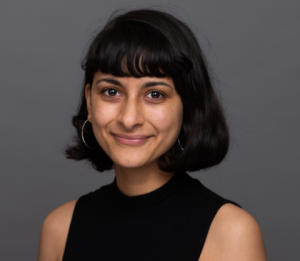 Mary is the Policy Officer working to deliver NSUN’s rights-based policy function and a 3-year project looking at the social determinants of mental health issues.
Mary is the Policy Officer working to deliver NSUN’s rights-based policy function and a 3-year project looking at the social determinants of mental health issues.
Mary has a background in bio-social anthropology and is particularly interested in intergenerational trauma and forced migration. She has previously worked at Cancer Research UK (Oxford Centre) in project management and at PsychUP for Wellbeing, a student mental health change programme where she focused on communications strategy.
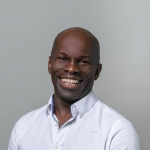 Maurice’s 25-year career in journalism has seen him write on politics, society, race and current affairs for the Voice, the Guardian, The Express, The Independent and The Spectator.
He was one of the directors of the influential media platform Media Diversified and was Communications Manager at NCVO. He is an expert communicator and appears regularly on LBC, TalkRadio and the BBC talking about race and society. Maurice is well networked in the political world while keeping active in local grassroots campaigning.
Maurice’s 25-year career in journalism has seen him write on politics, society, race and current affairs for the Voice, the Guardian, The Express, The Independent and The Spectator.
He was one of the directors of the influential media platform Media Diversified and was Communications Manager at NCVO. He is an expert communicator and appears regularly on LBC, TalkRadio and the BBC talking about race and society. Maurice is well networked in the political world while keeping active in local grassroots campaigning. Rheian Davies, Head of Legal, Mind Rheian has worked in Mental Health for thirty years. Rheian spend some 15 years as psychiatric nurse, mostly managing services and then qualified as a Solicitor in 2006. Whilst in private practice Rheian was awarded Legal Aid Lawyer of the Year for her work in mental health law. Rheian’s particular interests are Mental Health Act reform, public law claims and anti-racist work in the Mental Health system.
Rheian Davies, Head of Legal, Mind Rheian has worked in Mental Health for thirty years. Rheian spend some 15 years as psychiatric nurse, mostly managing services and then qualified as a Solicitor in 2006. Whilst in private practice Rheian was awarded Legal Aid Lawyer of the Year for her work in mental health law. Rheian’s particular interests are Mental Health Act reform, public law claims and anti-racist work in the Mental Health system.Delivering informed care for the LGBTQ+ community.
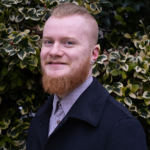 Rob is the Education Programmes Manager at Just Like Us, the LGBT+ young people’s charity. Just Like Us runs a number of initiatives to ensure that LGBT+ young people are empowered to champion LGBT+ inclusion and tackle prejudice. Over the past few years, School Diversity Week – their flagship initiative – has reached more than 4000 schools, and their young ambassadors have spoken in front of more than 70,000 young people.
Previous to this, Rob worked as a secondary Geography teacher for five years at an inner-city London school, taking the lead on adapting the pastoral, educational provision to better serve the changing needs of young people, particularly during the coronavirus pandemic.
Rob is the Education Programmes Manager at Just Like Us, the LGBT+ young people’s charity. Just Like Us runs a number of initiatives to ensure that LGBT+ young people are empowered to champion LGBT+ inclusion and tackle prejudice. Over the past few years, School Diversity Week – their flagship initiative – has reached more than 4000 schools, and their young ambassadors have spoken in front of more than 70,000 young people.
Previous to this, Rob worked as a secondary Geography teacher for five years at an inner-city London school, taking the lead on adapting the pastoral, educational provision to better serve the changing needs of young people, particularly during the coronavirus pandemic. 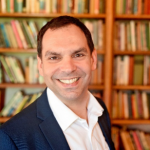 Silva Neves is a COSRT-accredited and UKCP-registered psychosexual and relationship psychotherapist and a trauma psychotherapist. He is a Pink Therapy Clinical Associate.
Silva Neves is a COSRT-accredited and UKCP-registered psychosexual and relationship psychotherapist and a trauma psychotherapist. He is a Pink Therapy Clinical Associate.
Silva specialises in GSRD (Gender, Sexuality and Relationship Diversities) and works extensively with LGBTQ+ people.
He is a Course Director for CICS (Contemporary Institute of Clinical Sexology) and speaks internationally, and is a member of the editorial board for the leading international journal Sex and Relationship Therapy. Mr Neves is also the author of Compulsive Sexual Behaviours, A Psychosexual Treatment Guide for Clinicians (2021, Routledge).
Week 2
Insights
How do we put the person at the centre of mental health care?
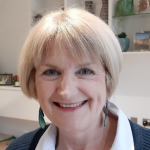 Sarah Rae has accessed mental health services on many occasions throughout her adult life. After a negative experience of acute care in 2005 she became determined to influence the design and delivery of services in her local mental health Trust.
During the last four years she has also brought together an experienced team of academics and clinicians to develop a major new research study: ‘Coproducing improved mental health acute inpatient discharge using a Systems Approach: MINDS’ https://www.nsft.nhs.uk/minds-study
This complex three-year NHIR project will apply a Systems Approach to co-design holistic discharge planning processes model for adult general acute mental health inpatient settings. The aim is to improve the outcomes and experiences for patients being discharged from mental health hospitals.
Sarah Rae has accessed mental health services on many occasions throughout her adult life. After a negative experience of acute care in 2005 she became determined to influence the design and delivery of services in her local mental health Trust.
During the last four years she has also brought together an experienced team of academics and clinicians to develop a major new research study: ‘Coproducing improved mental health acute inpatient discharge using a Systems Approach: MINDS’ https://www.nsft.nhs.uk/minds-study
This complex three-year NHIR project will apply a Systems Approach to co-design holistic discharge planning processes model for adult general acute mental health inpatient settings. The aim is to improve the outcomes and experiences for patients being discharged from mental health hospitals.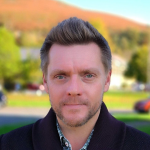 Richard has worked in Third Sector mental health and related services for 25 years, as a practitioner and in a variety of managerial roles at front line and senior level. During this time he has developed a particular interest and expertise in developing services as an alternative to mainstream provision.
Richard has worked in Third Sector mental health and related services for 25 years, as a practitioner and in a variety of managerial roles at front line and senior level. During this time he has developed a particular interest and expertise in developing services as an alternative to mainstream provision.
This has included leading on the the establishment of the first Crisis House in Wales as an alternative to inpatient admission, alternatives to residential care and bespoke support for those with complex need. Richard has been heading up Valleys Steps since July 2018 and is relishing the challenge of establishing the organisation as the acknowledged? Third Way? and alternative to anti-depressants and counselling in the treatment of stress, anxiety and mild to moderate depression.
Empowering young people affected by self-harm through community activism
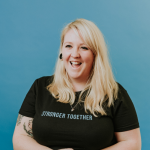 Established in 2013, Heads Above The Waves is a not for profit CIC that supports young people struggling with their mental health and specifically with self-harm. HATW tackles the stigma around these issues and promotes positive ways of dealing with the bad days.
Established in 2013, Heads Above The Waves is a not for profit CIC that supports young people struggling with their mental health and specifically with self-harm. HATW tackles the stigma around these issues and promotes positive ways of dealing with the bad days.
HATW works in schools and colleges with young people, running workshops to help them feel less alone and be able to cope better. They have a website where they share advice, coping techniques, peoples stories, and sign post to helplines (hatw.co.uk). They also run a shop in Cardiff where they sell merch, and provide a safe space for people to come and chat. HATW attends and runs events aimed at developing community and sharing experiences. In general they advocate for young people and want people to know it’s OK to not be OK. But with a focus on the importance of speaking about what you’re going through and finding what works for you.
Hannah is an Events Manager who, alongside co-founder Si, started HATW so that young people didn’t feel alone going through some of the things that they went through as teenagers. It all started with a conversation and has now snowballed due to Si and Hannah’s inability to say no to anything!
How to create innovative and impactful suicide crisis services
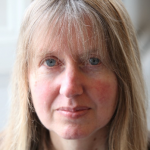 Joy is the founder and CEO of Suicide Crisis, a registered charity which runs an award-winning Suicide Crisis Centre in the UK. She set up the Suicide Crisis Centre while she was a patient under community psychiatric services in 2012.
Joy is the founder and CEO of Suicide Crisis, a registered charity which runs an award-winning Suicide Crisis Centre in the UK. She set up the Suicide Crisis Centre while she was a patient under community psychiatric services in 2012.
The work of the charity has attracted national and international attention, including from the Ministry of Health in New Zealand.
Joy was invited by the Government’s adviser on suicide to give a presentation about the work of the Suicide Crisis Centre to the national advisory group that he chairs. The labour Shadow minister for Mental Health has visited their Crisis Centre.
The Suicide Crisis Centre won the “Most Innovative Mental Health Intervention” award at the U.K. Mental Health and Wellbeing Awards 2021.
Joy is the author of two suicide prevention books. “Suicide Prevention Techniques: How A Suicide Crisis Service Saves Lives” was published by Hachette UK in 2018. “The Suicide Prevention Pocket Guidebook: How To Support Someone Who Is Having Suicidal Feelings” was published by Welbeck Publishing Group in 2021.
She received the Janey Antoniou award in 2018 which celebrates “extraordinary achievement in fighting stigma and discrimination and bringing about change”.
The charity’s website is at: http://www.suicidecrisis.co.uk
Week 3
Practice
What can our communities do for our mental health? What can professionals learn?
Dr Jen Daffin
 Dr Jen Daffin is a Community Clinical Psychologist with a passion for social justice. She has 15 years’ experience of working in NHS mental health and learning disability services and now works for a mental health and social change charity called Platfform
Dr Jen Daffin is a Community Clinical Psychologist with a passion for social justice. She has 15 years’ experience of working in NHS mental health and learning disability services and now works for a mental health and social change charity called Platfform Improving standards of delivery for neurodiverse people
Euan Hails
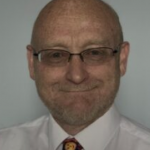 Professor Euan Hails is Adferiad Recovery’s Director of Clinical and Therapeutic Governance and a consultant nurse within the Aneurin Bevan University Health Board with responsibility for leading and developing nursing and allied health professionals and developing and leading clinical practice that is psychologically and research-based.
Professor Euan Hails is Adferiad Recovery’s Director of Clinical and Therapeutic Governance and a consultant nurse within the Aneurin Bevan University Health Board with responsibility for leading and developing nursing and allied health professionals and developing and leading clinical practice that is psychologically and research-based. Importance of spirituality and cultural sensitivity in practice
Mental health is understood by every different community through a diverse range of attitudes, values, and norms. In a therapeutic setting, professionals should be aware of the range of cultural beliefs that they may encounter and the role of spirituality within a service user’s journey, and how these interact with service users’ perspectives on the world and their mental health, to be able to treat that individual with sensitivity and respect.
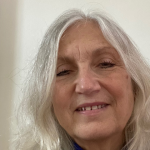 Sarajane Aris is a Consultant Clinical Psychologist, Associate Fellow of the British Psychological Society and Fellow of the Royal Society of Arts.
She was the national lead for Spirituality for the British Psychological Society (2002-2010), and the psychology representative on the National Mental Health and Spirituality Forum during this time. She was responsible for setting up Derbyshire Mental Healthcare Foundation Trusts Spirituality Strategy and Steering Group (2009-11). She has facilitated and run a variety of training courses and workshops, in areas such as mindfulness, leadership, wellbeing, and death and dying over the years.
Sarajane Aris is a Consultant Clinical Psychologist, Associate Fellow of the British Psychological Society and Fellow of the Royal Society of Arts.
She was the national lead for Spirituality for the British Psychological Society (2002-2010), and the psychology representative on the National Mental Health and Spirituality Forum during this time. She was responsible for setting up Derbyshire Mental Healthcare Foundation Trusts Spirituality Strategy and Steering Group (2009-11). She has facilitated and run a variety of training courses and workshops, in areas such as mindfulness, leadership, wellbeing, and death and dying over the years.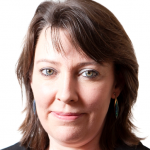 Dr Hilary Garraway is an experienced consultant clinical psychologist and BABCP accredited CBT therapist, supervisor and trainer. She has over thirty years of therapy experience in various settings including cross-culturally both in London and in Uganda. Until recently she worked full time as an adult psychology lead in North London. Before that she worked in Early Intervention in Psychosis teams as well as having a successful private practice.
Hilary also trained as an adult education teacher and is an honorary lecturer at University College London, University of Hertfordshire and King’s College London. She is the former chair of the National Spirituality and Mental Health Forum and former British Psychological Society spirituality lead. Currently, she is a trustee of the Whole Person Health Trust and Whole Care which seek to promote a more holistic approach to medical care.
Hilary has trained in art therapy, creative writing, ecotherapy and spiritual direction and she seeks to bring these threads of creativity, spirituality and psychology together in her work. This has led to the development of Holistic Cognitive Behaviour Therapy. Last year she had a book published on this therapy and the related ‘Free to be Me’ course manual as well as working with others on publishing the ‘Mental Health, Spirituality and Wellbeing’ handbook
Dr Hilary Garraway is an experienced consultant clinical psychologist and BABCP accredited CBT therapist, supervisor and trainer. She has over thirty years of therapy experience in various settings including cross-culturally both in London and in Uganda. Until recently she worked full time as an adult psychology lead in North London. Before that she worked in Early Intervention in Psychosis teams as well as having a successful private practice.
Hilary also trained as an adult education teacher and is an honorary lecturer at University College London, University of Hertfordshire and King’s College London. She is the former chair of the National Spirituality and Mental Health Forum and former British Psychological Society spirituality lead. Currently, she is a trustee of the Whole Person Health Trust and Whole Care which seek to promote a more holistic approach to medical care.
Hilary has trained in art therapy, creative writing, ecotherapy and spiritual direction and she seeks to bring these threads of creativity, spirituality and psychology together in her work. This has led to the development of Holistic Cognitive Behaviour Therapy. Last year she had a book published on this therapy and the related ‘Free to be Me’ course manual as well as working with others on publishing the ‘Mental Health, Spirituality and Wellbeing’ handbook Dr Sara Betteridge is a Counselling Psychologist and Family Therapist who has specialised in faith-based approaches (with a particular focus in Islam) and the Open Dialogue systemic way of working. Her work as a Muslim mental health chaplain/spiritual care advisor in a mental health NHS Trust alongside her doctoral thesis which focussed on ways of incorporating faith into different psychotherapeutic models; have contributed to her extensive experience in this field. She continues to work as an Individual and Family Therapist, Group facilitator, Supervisor, and Trainer in both Open Dialogue and in working with faith in therapy and mental health services.
Dr Sara Betteridge is a Counselling Psychologist and Family Therapist who has specialised in faith-based approaches (with a particular focus in Islam) and the Open Dialogue systemic way of working. Her work as a Muslim mental health chaplain/spiritual care advisor in a mental health NHS Trust alongside her doctoral thesis which focussed on ways of incorporating faith into different psychotherapeutic models; have contributed to her extensive experience in this field. She continues to work as an Individual and Family Therapist, Group facilitator, Supervisor, and Trainer in both Open Dialogue and in working with faith in therapy and mental health services.